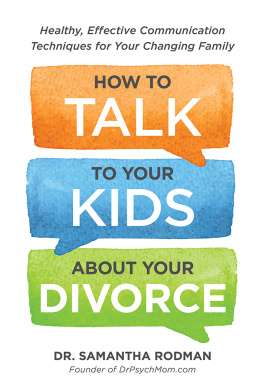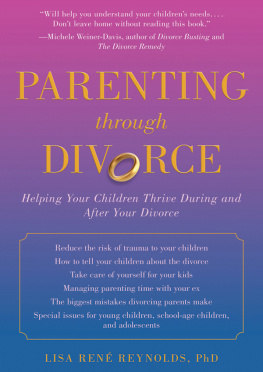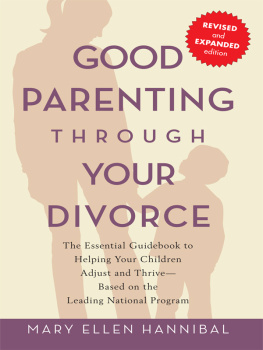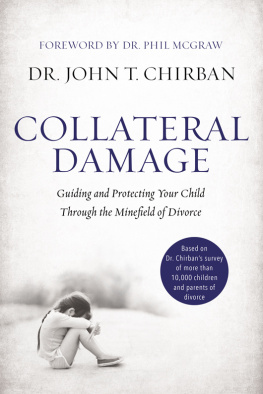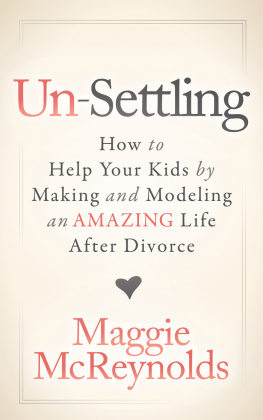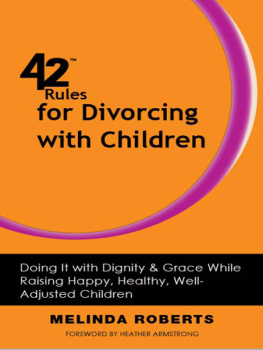Contents
Guide
HOW TO
TALK
TO YOUR
KIDS
ABOUT YOUR
DIVORCE
Healthy, Effective Communication Techniques for Your Changing Family
DR. SAMANTHA RODMAN
Founder of DrPsychMom.com

Avon, Massachusetts
DEDICATION
This book is dedicated to my husband and children for their love and support, and to my readers and clients for sharing their experiences with me.
CONTENTS
Part 1
Talking about Divorce
Chapter 1
Divorce: Not One-Size-Fits-All
Chapter 2
The Language of Divorce
Chapter 3
The Confidante Problem
Chapter 4
Every Child Is Different
Chapter 5
How Emotions Work
Chapter 6
Communication Skills
Chapter 7
How to Talk about Your Co-Parent
Part 2
How to Connect at Every Age and Stage
Chapter 8
Toddlers and Preschoolers
Chapter 9
Elementary-School Kids
Chapter 10
Middle-School Kids
Chapter 11
High-School Kids
Part 3
New Challenges
Chapter 12
New Partners, New Problems
Chapter 13
One Thing After Another
Chapter 14
Keep On Keepin On
INTRODUCTION
If youre reading this book, its because youre struggling with the idea or the reality of divorce, and concerned about the impact it will have on your children. First, let me say how sorry I am that youre in this place. An extensive history of marital conflict, disappointment, and hurt usually precedes one or both partners deciding to divorce. Divorce is one of lifes most painful and harrowing experiences, and, according to research, only the death of a spouse is more stressful. (And I would be willing to bet that divorce can take the number-one place in many circumstances.)
No matter how many other issues are racing through your mind right nowand there are likely more than you can countyouve chosen to set aside time to read a book on communicating with your kids about divorce. This indicates that youre fully committed to maintaining the psychological and emotional wellbeing of your children during this difficult time, and that you want to minimize the disruption and pain that your divorce will cause. As a psychologist, I commend you on taking this step to proactively work on easing your childrens distress about your divorce. Many parents avoid thinking about the painful reality of their childrens anxiety and confusion during this process, and just hope for the best. Unfortunately, a less proactive approach often means that children have no idea what is happening, and end up feeling lost, betrayed, and angry.
Thankfully, there are many concrete tools that you can use in order to communicate effectively with your children about the topics of separation and divorce, whether they are toddlers only starting to talk, elementary-school age, or teenagers. This book aims to reduce your stress in at least this one area; if you know that youre facilitating open and developmentally appropriate communication with your kids, you can feel confident that you have tried your hardest to help them through this difficult process. These tools are simple and straightforward, and, best of all, they can be used to communicate with kids about any topic, not only divorce.
Whether or not your co-parent reads this book, or is on board with the advice that it gives, you can still use it very effectively to help yourself and your child have a healthier and more open relationship. Of course, the stress of conflict with your co-parent cannot be overstated, and this book will also cover ways to decrease some of this conflict. Although its easier said than done, if you are able to feel more positive, or even more neutral, toward your co-parent, this can be perhaps the most important thing that you do for the psychological wellbeing of your children.
This book will also include many anonymized questions, quotes, and examples from real-life veterans of divorce and adult children of divorce, the readers of DrPsychMom.com, and examples I have fictionalized that touch upon issues I have discussed over the years with clients going through divorces. These examples provide glimpses of the experiences of people who have been in the trenches of separation and divorce. Hopefully, they will resonate with your personal experiences, and help give voice to your own struggles.
By the end of this book, youll be able to:
- Understand what children commonly feel when their parents divorce
- Discuss divorce-related topics (e.g., separate homes, visits, why this happened) in age-appropriate ways with your child
- Initiate conversations where your children can feel safe in expressing their honest feelings about the divorce
- Realize the dangers of confiding too deeply in your child, and change this dynamic
- Know when and how to get help for your own divorce-related emotional struggles
- Know how emotions work, and how to teach emotional awareness and acceptance to your child
- Understand how children may express their feelings in different ways, based on their ages and personalities
- Empathize with your childs experience without trying to fix or minimize it
- Validate your childs feelings, making your child feel safe and secure
- Understand why I keep referring to your ex-spouse as a co-parent throughout this book, and why its so important to use this term yourself
- Understand the difference between forcing your children to communicate and allowing them the space to come to you
- Feel confident that youve opened up the lines of communication with your child, not only about divorce, but about all difficult or sensitive issues
- Discuss hot-button topics with your child without losing your cool
- Incorporate more positive bonding activities into your post-divorce life with your child
- Realize that your divorce will not break your child, and realize that the way you talk about the divorce may actually strengthen and deepen your relationship with your child
I see many adult clients who were children of divorce, and for every one that felt traumatized by the divorce, there is one who feels that, in fact, the divorce was a positive thing, as the child ended up with two happier parents, and often, loving stepparents. The common denominators among happy and well-adjusted adult children of divorce are that they did not feel ignored, caught in the middle of sparring parents, or expected or forced to act or feel a certain way. Their perspectives and emotions were heard and understood rather than minimized, denied, or devalued, and their preferences were taken into account in developmentally appropriate ways. These are worthy goals for any divorcing parentto try your hardest to make your child feel heard, acknowledged, prioritized, and safe.
Note: Throughout this book, male and female pronouns will be used interchangeably. Unless otherwise specified, the issues discussed apply to both male and female children. Additionally, there are specific times that I recommend seeking help from a therapist. By this, I mean a trained professionala psychologist, social worker, or licensed counselorwho preferably has experience working with divorcing families. Even if I do not explicitly recommend counseling for an issue you may be going through, please always seek counseling if you feel that it is necessary to help you and your child through a particularly challenging time. Now, lets begin setting the stage for understanding how to communicate with your child about your divorce.

